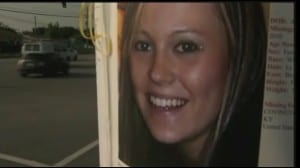
After Thirteen Years Mystery Still Surrounds Disappearance of Amy Lynn Bradley
VA – On March 24, 1998, Amy Lynn Bradley, mysteriously vanished while vacationing with her family aboard the Royal Caribbean cruise ship, Rhapsody of the Seas. The ship had left Oranjestad, Aruba, to sail to Curacao, in the Netherlands Antilles.
The, 23-year-old trained lifeguard, had been awarded a full basketball scholarship and graduated from Longwood University in VA with a degree in Physical Education. Amy also had a teaching certificate from K -12. Amy was looking forward to a future bright with possibilities prior to her disappearance. She had lots of plans upon her return. She adopted an English bulldog named Daisey to keep her bulldog Bailey; took a dozen rolls of film to take pictures to decoupage her coffee table; had concert tickets; a part time job to start on Monday; bought gifts in Aruba for her friends back home; sent post cards to friends from Puerto Rico. The ill-fated Caribbean family vacation with parents, Ron and Iva Bradley, and Amy’s younger brother, Brad, should have been a trip of a lifetime but quickly became overcast amidst darkness and mystery.
Rhapsody of the Seas had left Aruba and was in docking procedure in the Port of Curacao, Netherlands Antilles, at the time of Amy’s disappearance. In the early morning hours of March 24th, Amy left her cabin barefoot only taking her lighter and cigarettes, an obvious sign she was not expecting to be gone for an extended amount of time.
Reflecting on the days before Amy’s disappearance, Amy’s mother, Iva Bradley, recalls several members of the crew paying special attention to Amy from the moment they boarded the ship. The day preceding Amy’s disappearance, Amy’s parents were approached by a waiter who asked for Amy by name. The waiter said ‘they’ wanted to take Amy to Carlos and Charlie’s Restaurant while docked in Aruba. Her father recalls thinking the waiter’s request was uncomfortably forward. A short time later, Ron and Iva told their daughter what happened. Both parents are now haunted by Amy’s response, “I wouldn’t go and do anything with any of those crew members. They give me the creeps.”
Creepy didn’t stop there. Later that night, the family attended a party on the upper deck where the band was playing. During the party, Amy, accompanied by her mother, went to the 4th deck photo gallery to view pictures of vacationers that had been taken earlier in the evening. All of the photographs taken of Amy were missing. When they asked the gallery manager where the photos were, he stated he remembered developing them and placing them with the others but was unable to locate them. Iva then asked the photo gallery manager to re-make the photos.
Later that evening Amy and Brad went to the ship’s nightclub and where Amy had some interaction with ship band members of Blue Orchid. Witnesses claim the bass player was trying to pick her up. According to band member Alister Douglas, who goes by the name Yellow, claims Amy had departed to her room at approximately 1:00AM and used the crew elevator. A ship surveillance video showed Amy and Yellow on the dance floor at approximately 3AM. Amy’s father was the last to see her on March 24th at approximately 5:30AM sleeping on the balcony of the cabin the family shared. When Ron awoke again between 5:50- 6:00AM, Amy was nowhere to be found. While relentlessly searching for their beloved daughter, Amy’s parents have endured an unimaginable journey into the abyss of international kidnapping and sex trafficking. Who Amy may have left to meet that morning remains a mystery.
According to the Bradley’s, they quickly found cruise ship management less than cooperative in the search for their daughter refusing to issue a formal public alert or post pictures of the missing American woman for fear of causing concern to other passengers. Though the FBI has conducted an extensive investigation, into Amy’s background, her friends, teachers, relatives, co-workers, employees, basketball coaches, her parents and brother were even polygraphed. Unfortunately, because Amy vanished outside of the US and lack of FBI jurisdiction in the Netherland Antilles, valuable leads have fallen through the cracks and never investigated. Not one search has ever been conducted.
In the 13 years following Amy’s disappearance, the Bradley’s desperate search for their daughter has included multiple trips to Curacao, appeals on national television, even hiring private investigators. Since Amy’s mysteriously disappeared, many tips reported that appear credible. One of the tipsters, David Carmichael, called the hotline after watching an Unsolved Mysteries segment. He confidently identified Amy as a young woman he saw walking along the beach snug between two men. Describing the encounter, Carmichael, along with his dive buddy, also from Canada, identified two tattoos that matched Amy’s, one of a Gecko, the other a Tasmanian devil. He said the woman approached within 16” of him and his friend and made eye contact for several seconds but didn’t utter a word. He said she was then quickly ushered away by the two unidentified men. Another tip came from a US Navy officer that had visited a brothel in 1999. After seeing Amy in People Magazine, he claims he approached Amy and another woman sitting at a table and the woman told him her name was Amy Bradley and began begging him to help her. When he responded there was a Navy ship just down the road, she said, “You don’t understand, I can’t leave. Help me. Please help me” The Naval officer says he dismissed her plea because he wasn’t aware Amy was a missing person and he did not want his superiors to know he was there.
Thousands of leads later, it’s hard to ignore the circumstances of Amy’s disappearance do not strongly point to sex trafficking. According to a 2010 report conducted by the UN Refugee Agency (UNHCR), and published by the United States Department of State, the Netherland Antilles is a transit and destination point for women and children who are victims of forced prostitution in a multi-billion dollar industry. It is estimated approximately 80% of all prostitutes are foreigners. The UN Office on Drugs and
Crime (UNODC) lists the Netherlands as a top destination for victims of human and sex trafficking. Women who are coerced or kidnapped face inhumane conditions, extreme violence and multiple rapes to break their spirit. Victims are often threatened with death along with their family members should they try to escape; forced drug dependence is also common.
When we think of the word unimaginable, Amy’s parents truly know its meaning. “Our lives have been so drastically changed. Every waking moment is, ‘Where is Amy?’ I just want people to know that when girls disappear outside of the country, they’re disappearing for a reason. And white slavery and sex trafficking is so alive and well, it would absolutely blow you away. We believe with every fiber in our being that someone took her and we want her back. And I have tried to make deals with God. If we find her today, you can take me tomorrow. When they say the worst nightmare, it is. It’s the worst nightmare.”
Thirteen years later, Amy remains missing in an ocean of international red tape and a series of events that have failed to be investigated. Sadly, as the Bradleys found out, when you are traveling overseas and someone you love goes missing – you are on your own.
Contact Missing Persons Investigator




